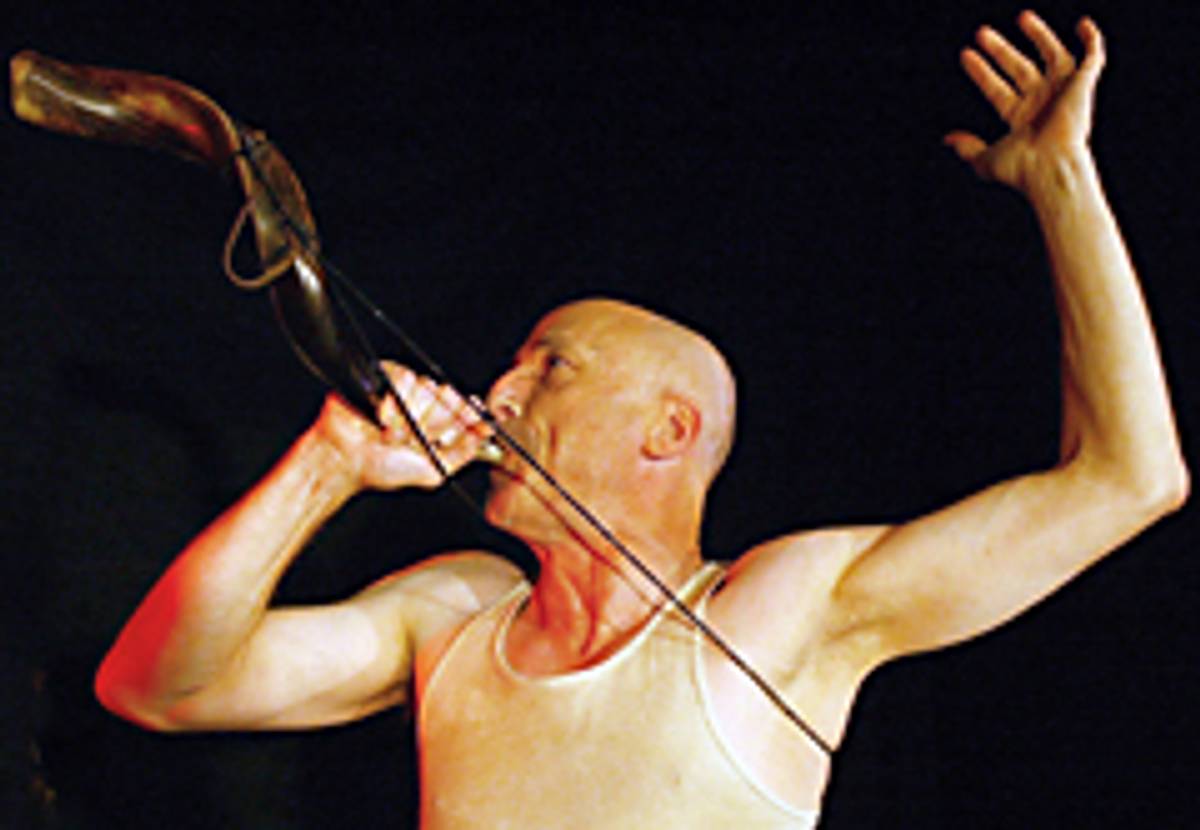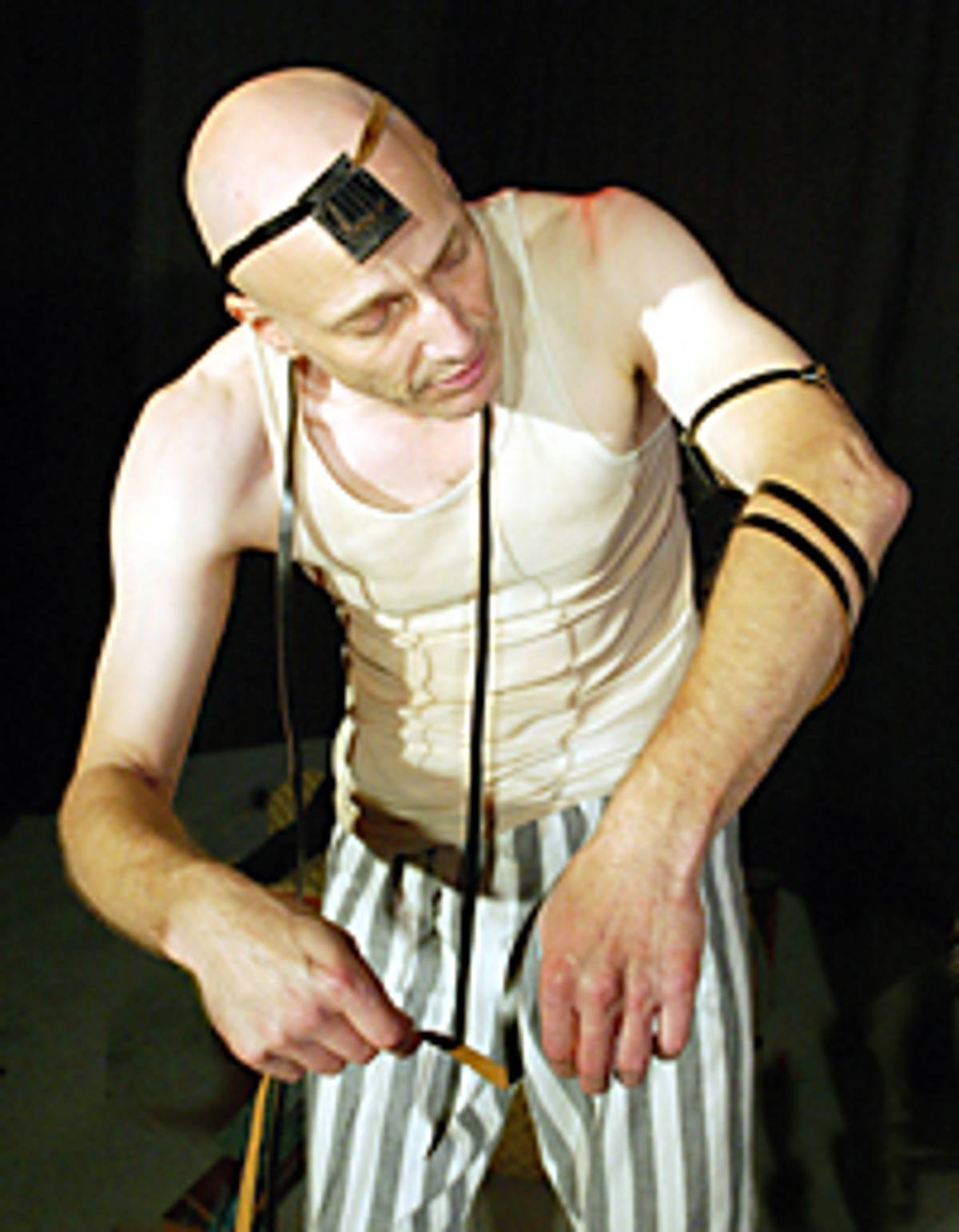Eliot Fintushel’s Breakfast With The Ones You Love is one weird novel. The main character, 16-year-old tough girl and so-called “shiksie” Lea Tillim, boasts a shaved head, a powerful distaste for smiling, and the ability to kill things with her mind. She doesn’t like many people, but takes a fancy to Jack, a.k.a. The Yid, the neighborhood pot dealer who believes he’s been tapped by God to build a spaceship in an abandoned section of Sears to carry 13 of the “chosen” people up to the Promised Land. The genre-bending mash-up mixes science fiction, religion, and a coming-of-age story into a blunt, trippy, strangely sweet concoction.

The 59-year-old Fintushel defies categorization himself. A performance artist, mime, teacher, and musician, in addition to being a writer, Fintushel has twice received the National Endowment for the Arts solo performer award. His short stories, about haunted dreidels and hotel managers who battle aliens (those are just the ones that can be synopsized) have been selected for anthologies including The Year’s Best Science Fiction and Jewish Detective Stories for Kids. Breakfast, which has just been released by Bantam, is his first novel.
Though he now lives in Northern California, Fintushel grew up in an immigrant community in Rochester, New York, with Yiddish-speaking grandparents. His father was a baker and a machinist; his mother took care of accounts receivable for a Jewish old-age home. He spoke with Nextbook about his novel, his religious beliefs, and the strange world of science-fiction conventions.
What was the initial inspiration for this novel?
The kernel of the idea for the novel is that character, Lea. I just fell in love with her. I tell you, it’s kind of embarrassing but even now when I read over parts of the book it makes me cry, because she makes such a heroic effort to put on a tough exterior and she’s so soft inside. The book is a pretty standard coming of age story. She starts out really hard and she tries like hell to hold onto that hardness. She doesn’t want to let it slip away. She’s afraid of what will happen if she softens up. But the whole book is about how gradually she softens up and becomes involved and committed, through her love for Jack, and also her love for other people in the book, and the people who fall in love with her.
I agree that in some ways it is a standard coming-of-age story, but then in others it’s not at all: this girl has magical powers and her boyfriend is trying to fly off in a spaceship to meet God. So where did this other stuff come from?
I took a lot of it from things I knew already. It’s set in Rochester, New York, so a lot of things are taken right out of there. There was a restaurant I worked in and it actually is next to an old Sears, Roebucks building. I think Jack is a former me. I think that’s how I see myself when I was teenager, as this crazy guy. I grew up in Rochester but it was as if I was in the Old World, because I was surrounded my whole childhood by these old people speaking Yiddish….All those are people that I knew, aunts and uncles or family friends, constantly bickering and loveable and irascible at the same time, so they found their way into it.
Do you speak Yiddish?
I know a lot of Yiddish opera songs, and I can get around a kitchen and I can swear a bit, but I’m not really fluent.
You said you think Jack is sort of a teenage version of you, and Jack is a real believer. What’s your relationship to Judaism?

I am not observant. When I was a kid I was very serious about Judaism. I went through a phase around 10, 11, 12 when I was really very serious about it and I even wanted to go to a rabbinical school. I’m very grateful that my parents didn’t let me. I wouldn’t have been able to conform to what was required of me there. And then during the explosion of my adolescence, when I was doubting everything, I began to rethink the whole business of religion. The real knockout punch for me came when a kabbalist from New York came to Rochester and gave a talk at a yoga center. I was looking for those qualities of Judaism that were universal, that would apply to anyone. But I saw, in the end, that what it came down to for him was, “Was your mother Jewish?” When I saw that was true, and true generally of the Jewish saintly or scholarly people that I saw, I became very disaffected, a secular Jew. When I looked for religion after that I looked for it in Buddhism. Of course, Buddhism is as sectarian and parochial as any religion in large parts of it, but there are parts of it that really are just purely universal, spiritual.
How did you start writing?
It’s kind of a funny story. I was in Rochester, making my living doing mime and mask performances. But when I moved to California I left all my contacts behind. It would take me a while to get any gigs, so in my typical illogic I thought I’m going to do something that doesn’t depend where I am, I’m going to become a writer. I started writing in 1990 and I promised myself that if nothing came of it I would just quit in two years, but at the end of the year I started selling lots of stories to science fiction magazines so I kept at it.
Why did sci-fi appeal to you in particular?
I had been told by a writer that genre markets were the easiest to break into, and because I have a crazy kind of mind, it came easily to me.
If he had said, “it’s easiest to get literary short stories published,” you would have tried to do those?
Yeah, I would have. I wrote just one and sold it to the Ohio Review before it folded. It was a literary short story about my father’s madness. He went crazy when I was about 12 and stayed that way for the rest of his life. It was actually the inspiration for most of the things that I wrote, because most of what I’ve written in science fiction has to do with what happens between the time you see something and the time you figure out what it is, that little crazy moment in there. And there are lots of characters who have some difficulty or confusion or insight into that and a lot of it derives from my father’s madness.
At this point, do you feel more attached to the world of science fiction?
The stuff I write doesn’t easily fit in an established genre. It’ll get put in the science fiction section inevitably, and science fiction fans will be disappointed in it. I’ve read and admired some science fiction writers, Philip K Dick and Theodore Sturgeon, Bradbury of course, but I’ve never really been a fan. The science fiction fan is a wonderful animal. When I go to science fiction conventions I am astonished and terrified. It’s really strange. It’s a strange social phenomenon. I don’t feel connected with it.
I get hate mail, occasionally, from people who are upset that my stories are in their science fiction magazine. One guy complained about a story I wrote called “Izzie and the Father of Terror,” in which (just to give you an idea) someone tries to get the pyramid aboard an airplane, and succeeds. This guy said that he wished the Hale-Bopp comet would come by again and take me with it! And I wrote to him. We had a little correspondence. And this story got nominated for a Nebula award , and they sent me a little pin, and I sent it to this guy. He was very pleased.
The only way I’ll succeed as a novelist is by succeeding as a novelist so there’s some genre described as Fintushel. Actually I was pleased to notice some people talking about my work had started using my name as an adjective, they’ll call other things “Fintushelian.”
There have been a lot of Jewish science fiction writers, but not many of them write overtly about Jewish themes. You do, though, even if you don’t necessarily believe. Are you consciously writing about Judaism?
There have been moments in my life where I have consciously tried to repress it and not write about that stuff or do theater about that stuff. When I was a kid it often happened that someone would call me a dirty Jew and I would have to be careful when I walked with Hebrew books that the Hebrew lettering wasn’t showing. It wasn’t something that was easy for me, I was afraid of sticking out.
But on the other hand, the older I get the less that matters to me, and the more I see that it’s just this astonishing colorful world I came from. I look back on my childhood and I can’t imagine that it was this country, it was just so imbued with this special Yiddish-speaking culture. So I make use of it.